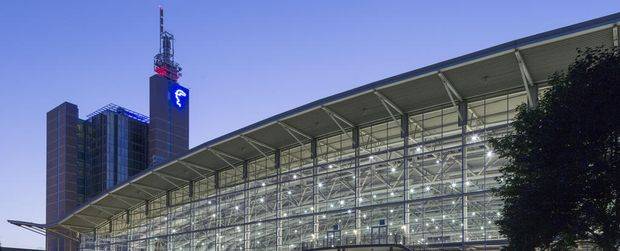[ihc-hide-content ihc_mb_type=”show” ihc_mb_who=”reg” ihc_mb_template=”3″ ]
Date: 24th April 2018,
Venue: Hannover Messe, Pavillon P36, Technology Academy
HOW MECHANICAL ENGINEERS USE ADDITIVE TECHNOLOGIES
• For today, Tuesday, April 24th, the Additive Manufacturing Association within VDMA has organized a top-class symposium.
• From 10:00 a.m. to 3:00 p.m. in Pavillon P36, experts will report on advantages of additive manufacturing processes for metals and plastics in mechanical engineering.
Hannover, April 24th, 2018 – Digital Factory and fully interlinked process worlds of Industry 4.0 are the main themes of HANNOVER MESSE 2018. “Therefore, the fair offers the perfect background for a discussion on additive process chains in mechanical engineering. After all, the processes of additive manufacturing are digital at their core,” explains Rainer Gebhardt, the responsible project manager of the Additive Manufacturing Association within VDMA.
Today, Tuesday, April 24th, a top-class podium taking place in Pavillon P36 will discuss specific applications of additive processes in mechanical engineering and their potentials for Digital Factory. Entrance to the fourth Additive Manufacturing Symposium at HANNOVER MESSE is free. All contributions will be translated simultaneously into English for international visitors. After a lecture program from 10:00 a.m. to 3 p.m., there will be a reception offering opportunities for networking. The event will finish with German and English guided tours “Additive Manufacturing” from 3:30 p.m. to 4:45 p.m. (costs: 13 Euro plus VAT)
Targeting the whole process chain – industrialization in progress
Representing TRUMPF Laser- und Systemtechnik, Steffen Rübling will explain the whole process chain of selective laser melting, including pre-process and post-process steps. His core thesis: potentials of new additive applications can only be assessed realistically if looking at the whole process chain. Rübling picks up on the trend of industrial users analyzing exactly when and where additive technologies present an advantage. “While some onlookers interpret this as disenchantment, it actually means a growing seriousness in dealing with these new technologies,” Gebhardt clarifies. From his talks with the nearly 140 member companies of the Association, he knows that mechanical engineers and system manufacturers regard AM as an important addition to traditional series production, and that they are integrating it into their work. “This integration is based on an informed cost-benefit analysis,” he explains. The original hype fired by fascination is now moving into broad industrial application. Which raises the question whether AM is already mature enough for series production. Patrick Diederich, manager at Sauer GmbH and Realizer GmbH under the roof of DMG MORI, will give answers to that question based on current applications and potential fields of application in the future.
Digital, efficient, and flexible: trends in metal and plastics processing
Material efficiency and design freedom are strong arguments in favor of AM. Yet, there are still weaknesses in process length and installation size. Marcus Ortloff, from the Berlin start-up Gefertec, presents a new technology intended to overcome these limiations: 3D Metal Print (3DMP®). Using wires suited to welding instead of powder, this technology manages even larger components in short time.
Global companies are concerning themselves with the productivity of additive technologies as well. Dr. Karsten Heuser from the Siemens department Digital Factory will talk about the chances in digitalization along the whole process chain. So far, the digital AM core process is often embedded into pre- and post-processes reminiscent of factories. “Automation is key to a successful industrialization of the technologies,” explains Gebhardt. He emphasizes the importance of furthering the development of technologies as well as the material range. For HP, their sales manager Emilio Juarez will describe how 3D Printing Jet Fusion Solutions with the growing range of materials open up new possibilities of application.
At today’s symposium, ARBURG team manager Dr. Agnes Kloke will show up possibilities in using the ARBURG plastics freeformer to individualize mass products and to produce small batch series in various material and color combinations. Advantages: with the toolless technology, qualified and oftentimes certified standard granulates can be processed. While injection molding remains the technology of choice for large-scale production, AM offers the flexibility necessary for small batch series and individual parts. Stratasys expert Frank Schäflein explains how mechanical engineers and system manufacturers use them. His presentation covers complex series components and additively manufactured equipment that make manufacturing processes faster, cheaper, and more precise.
From industrial practice for industrial practice
The lecture program ends with presentations by Johannes Lohn, Innovation Manager of Protiq GmbH, and Markus Felsch, Application Engineer with 3D Systems. As a spin-off belonging to the Phoenix Contact Group, Protiq specializes in selective laser sintering of copper alloys, among other things, and they also offer their customers from mechanical engineering support with simulation-assisted design of AM components. Felsch also aims towards series production with metals, and he will additionally speak about integration into Industry 4.0 as a prerequisite for making Additive Manufacturing utilizable as a scalable process. “Our symposium offers information and education on additive technologies – from industrial practice for industrial practice,” explains Gebhardt. Anyone spontaneously interested is welcome to stop by the Pavillon P36 on the fair ground.
4th Additive Manufacturing Symposium: Mechanical Engineers as Users of Additive Manufacturing
Press Contact:
http://am.vdma.org
[/ihc-hide-content]


